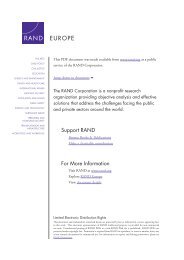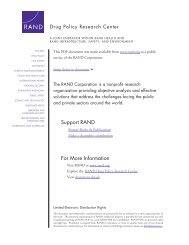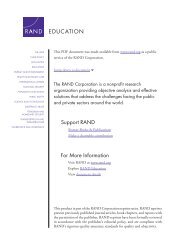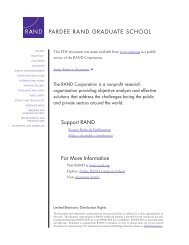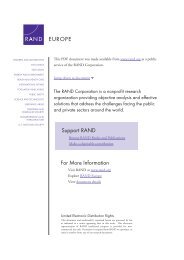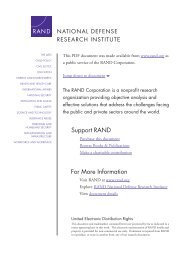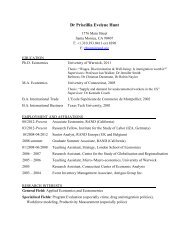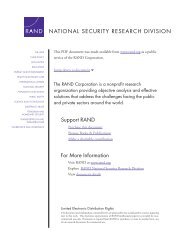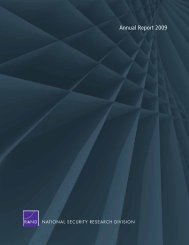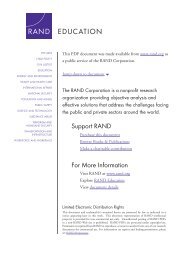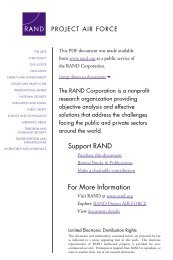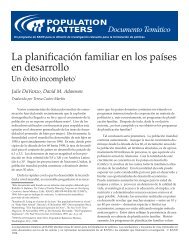Building Democracy on the Ashes of Authoritarianism in the Arab ...
Building Democracy on the Ashes of Authoritarianism in the Arab ...
Building Democracy on the Ashes of Authoritarianism in the Arab ...
You also want an ePaper? Increase the reach of your titles
YUMPU automatically turns print PDFs into web optimized ePapers that Google loves.
CHILDREN AND FAMILIES<br />
EDUCATION AND THE ARTS<br />
ENERGY AND ENVIRONMENT<br />
HEALTH AND HEALTH CARE<br />
INFRASTRUCTURE AND<br />
TRANSPORTATION<br />
INTERNATIONAL AFFAIRS<br />
LAW AND BUSINESS<br />
NATIONAL SECURITY<br />
POPULATION AND AGING<br />
PUBLIC SAFETY<br />
SCIENCE AND TECHNOLOGY<br />
TERRORISM AND<br />
HOMELAND SECURITY<br />
The RAND Corporati<strong>on</strong> is a n<strong>on</strong>pr<strong>of</strong>it <strong>in</strong>stituti<strong>on</strong> that helps improve policy and<br />
decisi<strong>on</strong>mak<strong>in</strong>g through research and analysis.<br />
This electr<strong>on</strong>ic document was made available from www.rand.org as a public service<br />
<strong>of</strong> <strong>the</strong> RAND Corporati<strong>on</strong>.<br />
Skip all fr<strong>on</strong>t matter: Jump to Page 16<br />
Support RAND<br />
Purchase this document<br />
Browse Reports & Bookstore<br />
Make a charitable c<strong>on</strong>tributi<strong>on</strong><br />
For More Informati<strong>on</strong><br />
Visit RAND at www.rand.org<br />
Explore <strong>the</strong> RAND Corporati<strong>on</strong><br />
View document details<br />
Limited Electr<strong>on</strong>ic Distributi<strong>on</strong> Rights<br />
This document and trademark(s) c<strong>on</strong>ta<strong>in</strong>ed here<strong>in</strong> are protected by law as <strong>in</strong>dicated <strong>in</strong> a notice appear<strong>in</strong>g<br />
later <strong>in</strong> this work. This electr<strong>on</strong>ic representati<strong>on</strong> <strong>of</strong> RAND <strong>in</strong>tellectual property is provided for n<strong>on</strong>commercial<br />
use <strong>on</strong>ly. Unauthorized post<strong>in</strong>g <strong>of</strong> RAND electr<strong>on</strong>ic documents to a n<strong>on</strong>-RAND website is<br />
prohibited. RAND electr<strong>on</strong>ic documents are protected under copyright law. Permissi<strong>on</strong> is required from<br />
RAND to reproduce, or reuse <strong>in</strong> ano<strong>the</strong>r form, any <strong>of</strong> our research documents for commercial use. For<br />
<strong>in</strong>formati<strong>on</strong> <strong>on</strong> repr<strong>in</strong>t and l<strong>in</strong>k<strong>in</strong>g permissi<strong>on</strong>s, please see RAND Permissi<strong>on</strong>s.
This product is part <strong>of</strong> <strong>the</strong> RAND Corporati<strong>on</strong> c<strong>on</strong>ference proceed<strong>in</strong>gs series. RAND<br />
c<strong>on</strong>ference proceed<strong>in</strong>gs present a collecti<strong>on</strong> <strong>of</strong> papers delivered at a c<strong>on</strong>ference or a<br />
summary <strong>of</strong> <strong>the</strong> c<strong>on</strong>ference. The material here<strong>in</strong> has been vetted by <strong>the</strong> c<strong>on</strong>ference<br />
attendees and both <strong>the</strong> <strong>in</strong>troducti<strong>on</strong> and <strong>the</strong> post-c<strong>on</strong>ference material have been reviewed<br />
and approved for publicati<strong>on</strong> by <strong>the</strong> sp<strong>on</strong>sor<strong>in</strong>g research unit at RAND.
C O R P O R A T I O N<br />
<str<strong>on</strong>g>Build<strong>in</strong>g</str<strong>on</strong>g> <str<strong>on</strong>g>Democracy</str<strong>on</strong>g> <strong>on</strong> <strong>the</strong> <strong>Ashes</strong> <strong>of</strong><br />
<strong>Authoritarianism</strong> <strong>in</strong> <strong>the</strong> <strong>Arab</strong> World:<br />
Workshop Summary<br />
By Laurel E. Miller and Jeffrey Mart<strong>in</strong>i<br />
Key Insights<br />
• Newly elected leaders <strong>in</strong> <strong>Arab</strong> transiti<strong>on</strong> states are fac<strong>in</strong>g<br />
enormous popular demands that go bey<strong>on</strong>d political<br />
reforms to <strong>in</strong>clude improvements <strong>in</strong> ec<strong>on</strong>omic outcomes and<br />
<strong>the</strong> provisi<strong>on</strong> <strong>of</strong> public services.<br />
• The unity engendered by <strong>the</strong> <strong>Arab</strong> revoluti<strong>on</strong>s has given way,<br />
<strong>in</strong> several countries, to severe political polarizati<strong>on</strong>. Forg<strong>in</strong>g<br />
<strong>of</strong> cross-ideological coaliti<strong>on</strong>s am<strong>on</strong>g Islamist and secular<br />
groups is critical to avoid<strong>in</strong>g this dynamic.<br />
• The effects <strong>of</strong> authoritarian legacies are countryspecific,<br />
and it is not clear that any <strong>Arab</strong> transiti<strong>on</strong> state<br />
is more disadvantaged than ano<strong>the</strong>r. But each state must<br />
address its authoritarian legacies <strong>in</strong> order to build a functi<strong>on</strong><strong>in</strong>g<br />
democratic system.<br />
• Political transiti<strong>on</strong>s br<strong>in</strong>g <strong>the</strong> promise <strong>of</strong> positive change but<br />
also <strong>in</strong>troduce <strong>the</strong> risk <strong>of</strong> excessive attachment to identities<br />
dur<strong>in</strong>g periods <strong>of</strong> uncerta<strong>in</strong>ty. Respect for m<strong>in</strong>ority rights<br />
and some decentralizati<strong>on</strong> <strong>of</strong> power are useful for allay<strong>in</strong>g<br />
<strong>the</strong> c<strong>on</strong>cerns <strong>of</strong> potential spoilers and build<strong>in</strong>g support for<br />
nati<strong>on</strong>al identities.<br />
• New <strong>Arab</strong> leaders are fac<strong>in</strong>g a balanc<strong>in</strong>g act <strong>in</strong> <strong>the</strong>ir<br />
implementati<strong>on</strong> <strong>of</strong> transiti<strong>on</strong>al justice. They must prioritize<br />
rec<strong>on</strong>ciliati<strong>on</strong> to build <strong>in</strong>clusive, stable political orders, while<br />
at <strong>the</strong> same time dem<strong>on</strong>strat<strong>in</strong>g to <strong>the</strong>ir publics that <strong>the</strong>re<br />
will be accountability for past abuses.<br />
• All <strong>the</strong> <strong>Arab</strong> transiti<strong>on</strong> states are faced with a need for security<br />
system reform. This, al<strong>on</strong>g with electi<strong>on</strong> assistance, is an area<br />
where <strong>the</strong> <strong>in</strong>ternati<strong>on</strong>al community is well positi<strong>on</strong>ed to help.<br />
• <strong>Arab</strong> political and civil society leaders are exam<strong>in</strong><strong>in</strong>g<br />
historical experiences <strong>of</strong> democratizati<strong>on</strong> <strong>in</strong> o<strong>the</strong>r regi<strong>on</strong>s to<br />
distill best practices that can <strong>in</strong>form <strong>the</strong>ir own political development.<br />
Mak<strong>in</strong>g <strong>the</strong>se less<strong>on</strong>s accessible and test<strong>in</strong>g <strong>the</strong>ir<br />
portability to <strong>the</strong> <strong>Arab</strong> world is <strong>on</strong>e way <strong>the</strong> <strong>in</strong>ternati<strong>on</strong>al<br />
community can support democratizati<strong>on</strong> <strong>in</strong> this regi<strong>on</strong>.<br />
After popular upris<strong>in</strong>gs toppled authoritarian<br />
leaders <strong>in</strong> Tunisia, Egypt, and Libya <strong>in</strong> 2011 and<br />
precipitated a negotiated power transfer <strong>in</strong> Yemen<br />
<strong>in</strong> early 2012, it quickly became comm<strong>on</strong>place to observe<br />
that oust<strong>in</strong>g a disliked regime was easier than replac<strong>in</strong>g<br />
it with someth<strong>in</strong>g better. The challenges that come after<br />
regime change—build<strong>in</strong>g new, more open political systems<br />
and resp<strong>on</strong>d<strong>in</strong>g to popular expectati<strong>on</strong>s <strong>of</strong> improved<br />
liv<strong>in</strong>g c<strong>on</strong>diti<strong>on</strong>s—have come to <strong>the</strong> fore. Political and<br />
social upheavals have been <strong>on</strong> full display as politicians,<br />
activists, and publics at large have struggled to def<strong>in</strong>e new<br />
rules for wield<strong>in</strong>g government power and new relati<strong>on</strong>ships<br />
between states and societies. In some <strong>in</strong>stances, <strong>the</strong><br />
need to reform deeply entrenched <strong>in</strong>stituti<strong>on</strong>al ways and<br />
means has become apparent, and <strong>in</strong> o<strong>the</strong>rs, <strong>the</strong> need to<br />
create entirely new state <strong>in</strong>stituti<strong>on</strong>s has become evident.<br />
And <strong>the</strong> upheavals have exacerbated ec<strong>on</strong>omic problems<br />
that already existed.<br />
That <strong>the</strong>se processes <strong>of</strong> political, ec<strong>on</strong>omic, and<br />
social change have been slow and arduous is unsurpris<strong>in</strong>g<br />
given <strong>the</strong> similarly difficult experiences <strong>of</strong> many o<strong>the</strong>r<br />
countries around <strong>the</strong> world as <strong>the</strong>y emerged from l<strong>on</strong>g<br />
periods <strong>of</strong> authoritarian rule. Never<strong>the</strong>less, <strong>the</strong> reality that<br />
such changes come nei<strong>the</strong>r quickly nor easily has frustrated<br />
many leaders and citizens <strong>of</strong> <strong>the</strong> countries affected.<br />
Indeed, <strong>the</strong> dramatic and participatory nature <strong>of</strong> <strong>the</strong> <strong>Arab</strong><br />
Spr<strong>in</strong>g upris<strong>in</strong>gs seems to have made <strong>the</strong> gap between<br />
popular expectati<strong>on</strong>s <strong>of</strong> change and actual results particularly<br />
pr<strong>on</strong>ounced, especially <strong>in</strong> comparis<strong>on</strong> to some <strong>of</strong> <strong>the</strong><br />
more protracted top-down or negotiated transiti<strong>on</strong>s <strong>in</strong><br />
o<strong>the</strong>r parts <strong>of</strong> <strong>the</strong> world.<br />
Aga<strong>in</strong>st this backdrop, <strong>the</strong> RAND Corporati<strong>on</strong><br />
and <strong>the</strong> Internati<strong>on</strong>al Strategic Research Organizati<strong>on</strong><br />
(USAK) jo<strong>in</strong>tly c<strong>on</strong>vened a workshop <strong>in</strong> Istanbul, Turkey,
2<br />
<strong>on</strong> April 24, 2013, to explore <strong>the</strong> policies and practical measures<br />
that <strong>Arab</strong> countries undergo<strong>in</strong>g political transiti<strong>on</strong>s can<br />
adopt to build endur<strong>in</strong>g democratic <strong>in</strong>stituti<strong>on</strong>s and practices.<br />
The purpose <strong>of</strong> <strong>the</strong> workshop was to provide a private sett<strong>in</strong>g<br />
<strong>in</strong> which policymakers, op<strong>in</strong>i<strong>on</strong> leaders, and experts from <strong>Arab</strong><br />
countries could reflect collaboratively <strong>on</strong> how to overcome<br />
obstacles to democratizati<strong>on</strong>. RAND and USAK sought to<br />
facilitate shar<strong>in</strong>g <strong>of</strong> experiences across <strong>the</strong> borders <strong>of</strong> countries<br />
<strong>in</strong> transiti<strong>on</strong>, through <strong>in</strong>formal discussi<strong>on</strong> <strong>in</strong> a roundtable<br />
format. It was agreed that no part <strong>of</strong> <strong>the</strong> discussi<strong>on</strong> would be<br />
attributed publicly to particular participants.<br />
Workshop participants came from Egypt, Tunisia, Libya,<br />
Yemen, Syria, and Jordan. They <strong>in</strong>cluded political party leaders,<br />
former m<strong>in</strong>isters, current <strong>of</strong>ficials and senior political advisers,<br />
heads <strong>of</strong> research <strong>in</strong>stituti<strong>on</strong>s, academics, and columnists.<br />
Participants’ political affiliati<strong>on</strong>s varied c<strong>on</strong>siderably <strong>on</strong> <strong>the</strong><br />
ideological spectrum, though <strong>the</strong> nature <strong>of</strong> <strong>the</strong> discussi<strong>on</strong>s was<br />
notably pragmatic ra<strong>the</strong>r than ideological.<br />
Under <strong>the</strong> broad banner <strong>of</strong> <strong>the</strong> workshop title—<str<strong>on</strong>g>Build<strong>in</strong>g</str<strong>on</strong>g><br />
<str<strong>on</strong>g>Democracy</str<strong>on</strong>g> <strong>on</strong> <strong>the</strong> <strong>Ashes</strong> <strong>of</strong> Autocracy: The Way Ahead for<br />
<strong>Arab</strong> Countries <strong>in</strong> Transiti<strong>on</strong>—participants focused <strong>on</strong> four<br />
ma<strong>in</strong> topics: approaches to develop<strong>in</strong>g new political systems<br />
and political parties; security threats to democratizati<strong>on</strong>; <strong>the</strong><br />
role <strong>of</strong> regi<strong>on</strong>al neighbors and <strong>the</strong> <strong>in</strong>ternati<strong>on</strong>al community <strong>in</strong><br />
support<strong>in</strong>g democratizati<strong>on</strong>; and less<strong>on</strong>s that can be learned<br />
from past experiences <strong>in</strong> o<strong>the</strong>r parts <strong>of</strong> <strong>the</strong> world. Participants<br />
also discussed Turkey’s democratizati<strong>on</strong> experience follow<strong>in</strong>g a<br />
lunche<strong>on</strong> address <strong>on</strong> <strong>the</strong> topic, and <strong>the</strong> challenges presented by<br />
<strong>the</strong> c<strong>on</strong>flict <strong>in</strong> Syria.<br />
This summary does not record <strong>the</strong> entire scope <strong>of</strong> <strong>the</strong><br />
discussi<strong>on</strong> but <strong>in</strong>stead highlights some important <strong>the</strong>mes that<br />
emerged throughout <strong>the</strong> workshop. In particular, it focuses<br />
<strong>on</strong> po<strong>in</strong>ts raised by participants that likely will be <strong>of</strong> <strong>in</strong>terest<br />
broadly to policymakers, civil society activists, and o<strong>the</strong>rs c<strong>on</strong>cerned<br />
with <strong>the</strong> prospects for democratizati<strong>on</strong> <strong>in</strong> <strong>Arab</strong> countries<br />
that have experienced upris<strong>in</strong>gs and regime changes s<strong>in</strong>ce 2011.<br />
PRoblems <strong>of</strong> PolARIzATI<strong>on</strong> And<br />
The sTRuggle foR PolITIcAl<br />
c<strong>on</strong>sensus<br />
Workshop participants expressed c<strong>on</strong>siderable anxiety about<br />
political polarizati<strong>on</strong> <strong>in</strong> <strong>the</strong> transiti<strong>on</strong> countries. Polarizati<strong>on</strong><br />
was seen as sett<strong>in</strong>g <strong>in</strong> very so<strong>on</strong> after <strong>the</strong> upris<strong>in</strong>gs and regime<br />
changes. Participants saw a need to develop c<strong>on</strong>sensus, but<br />
it was not apparent that <strong>the</strong>re was a shared understand<strong>in</strong>g <strong>of</strong><br />
<strong>the</strong> mean<strong>in</strong>g <strong>of</strong> <strong>the</strong> c<strong>on</strong>cept. Some <strong>in</strong>dicated that a c<strong>on</strong>sensus<br />
approach to politics would mean that a broad array <strong>of</strong> political<br />
parties would each have a share <strong>of</strong> decisi<strong>on</strong>mak<strong>in</strong>g, while o<strong>the</strong>rs<br />
emphasized that <strong>the</strong> essence <strong>of</strong> c<strong>on</strong>sensus was agreement <strong>on</strong> <strong>the</strong><br />
rules <strong>of</strong> <strong>the</strong> political play<strong>in</strong>g field. The discussi<strong>on</strong> <strong>of</strong> this issue<br />
reflected <strong>the</strong> <strong>on</strong>go<strong>in</strong>g struggle <strong>in</strong> <strong>the</strong>se countries to redef<strong>in</strong>e <strong>the</strong><br />
essential nature <strong>of</strong> politics <strong>in</strong> newly competitive systems.<br />
The lack <strong>of</strong> broad agreement <strong>on</strong> <strong>the</strong> political rules <strong>of</strong> <strong>the</strong><br />
game was seen by some as a particular problem <strong>in</strong> Egypt. The<br />
<strong>in</strong>troducti<strong>on</strong> <strong>of</strong> competitive politics and adopti<strong>on</strong> <strong>of</strong> a c<strong>on</strong>stituti<strong>on</strong>—while<br />
<strong>the</strong> fundamental rules rema<strong>in</strong>ed c<strong>on</strong>tested—<br />
c<strong>on</strong>tributed, <strong>in</strong> this view, to significant polarizati<strong>on</strong>. One <strong>of</strong><br />
<strong>the</strong> participants from Egypt noted that while it is <strong>in</strong> vogue<br />
for Egyptian leaders to call for c<strong>on</strong>sensus, <strong>the</strong>re is a lack <strong>of</strong><br />
will<strong>in</strong>gness by political groups to make <strong>the</strong> tough c<strong>on</strong>cessi<strong>on</strong>s<br />
necessary to achieve it. Ano<strong>the</strong>r Egyptian participant raised<br />
<strong>the</strong> questi<strong>on</strong> <strong>of</strong> whe<strong>the</strong>r <strong>the</strong> w<strong>in</strong>ners <strong>of</strong> <strong>the</strong> Egyptian revoluti<strong>on</strong><br />
were <strong>in</strong>capable <strong>of</strong> build<strong>in</strong>g a democratic system because <strong>the</strong>y<br />
<strong>the</strong>mselves are undemocratic <strong>in</strong> nature.<br />
The situati<strong>on</strong> is Egypt was c<strong>on</strong>trasted with Tunisia, where a<br />
slower, more deliberate transiti<strong>on</strong> process has produced greater<br />
c<strong>on</strong>sensus and stability. The ability <strong>of</strong> Tunisia’s ma<strong>in</strong> Islamist<br />
party and two secular parties to partner <strong>in</strong> form<strong>in</strong>g a government<br />
was lauded by participants as an example <strong>of</strong> <strong>the</strong> type <strong>of</strong> crossideological<br />
coaliti<strong>on</strong>s lack<strong>in</strong>g <strong>in</strong> o<strong>the</strong>r transiti<strong>on</strong><strong>in</strong>g countries.<br />
A variety <strong>of</strong> participants’ comments throughout <strong>the</strong><br />
workshop suggested that lack <strong>of</strong> experience with negotiat<strong>in</strong>g<br />
differences <strong>in</strong> <strong>the</strong> political sphere has led to some fear <strong>of</strong><br />
disagreement. On <strong>the</strong> <strong>on</strong>e hand, <strong>the</strong>re was a view that political<br />
polarizati<strong>on</strong> was a slippery slope to civil c<strong>on</strong>flict, <strong>in</strong> <strong>the</strong> absence<br />
<strong>of</strong> a deeply rooted democratic culture and <strong>in</strong> <strong>the</strong> shadow<br />
<strong>of</strong> popular upris<strong>in</strong>gs—several <strong>of</strong> which, especially Libya’s,<br />
<strong>in</strong>volved <strong>the</strong> use <strong>of</strong> violence. And even where civil c<strong>on</strong>flict<br />
appeared unlikely, <strong>the</strong>re were genu<strong>in</strong>e fears that democratizati<strong>on</strong><br />
<strong>in</strong> <strong>the</strong> regi<strong>on</strong> could manifest as strict majoritarianism.<br />
As a helpful counterpo<strong>in</strong>t, however, <strong>on</strong>e participant noted<br />
that <strong>the</strong> <strong>Arab</strong> Spr<strong>in</strong>g countries’ experiences with democratic<br />
processes are not as th<strong>in</strong> as comm<strong>on</strong>ly assumed. The participant<br />
noted that Tunisia, Egypt, and Libya had some exposure to<br />
democratic processes <strong>in</strong> <strong>the</strong> col<strong>on</strong>ial and/or m<strong>on</strong>archical periods<br />
<strong>of</strong> <strong>the</strong>ir histories. The same participant also noted that open<br />
political disagreement should actually be c<strong>on</strong>sidered a major<br />
achievement <strong>of</strong> <strong>the</strong> revoluti<strong>on</strong>s, given <strong>the</strong> absence <strong>of</strong> open political<br />
discourse under <strong>the</strong> former regimes. In this view, disagreement<br />
could be seen as a build<strong>in</strong>g block <strong>of</strong> politics. C<strong>on</strong>versely,
3<br />
elevat<strong>in</strong>g c<strong>on</strong>sensus and stability above <strong>the</strong> fractious politics <strong>of</strong><br />
democracy could lead to <strong>the</strong> emergence <strong>of</strong> new dictatorships. In<br />
order to realize <strong>the</strong> benefits <strong>of</strong> political disagreement, however,<br />
<strong>the</strong> rules <strong>of</strong> <strong>the</strong> game need to be crystallized.<br />
Several participants highlighted <strong>the</strong> importance <strong>of</strong> avoid<strong>in</strong>g<br />
<strong>the</strong> creati<strong>on</strong> <strong>of</strong> political arrangements that re<strong>in</strong>force sectarian<br />
and tribal affiliati<strong>on</strong>s. In this respect, both <strong>the</strong> Lebanese and<br />
<strong>the</strong> Iraqi political systems were referenced as negative examples.<br />
Participants expressed c<strong>on</strong>cern that, <strong>in</strong> <strong>the</strong>se cases, explicit<br />
or implicit quota systems were established al<strong>on</strong>g ethnic and<br />
sectarian l<strong>in</strong>es. This had <strong>the</strong> salutary effect <strong>of</strong> co-opt<strong>in</strong>g potential<br />
spoilers and ensur<strong>in</strong>g m<strong>in</strong>ority representati<strong>on</strong>. But <strong>the</strong>se<br />
arrangements also have hardened <strong>the</strong> political salience <strong>of</strong> identities<br />
and stifled <strong>the</strong> development <strong>of</strong> <strong>in</strong>terest groups based <strong>on</strong><br />
shared pr<strong>in</strong>ciples ra<strong>the</strong>r than l<strong>in</strong>eage or blood ties. Libya, Syria,<br />
and Yemen were all cited as potentially at risk <strong>of</strong> fall<strong>in</strong>g prey to<br />
c<strong>on</strong>flicts dom<strong>in</strong>ated by tribal, sectarian, and regi<strong>on</strong>al loyalties.<br />
One participant po<strong>in</strong>ted out <strong>the</strong> need for more research<br />
and analysis <strong>on</strong> how to overcome <strong>the</strong> challenges <strong>of</strong> establish<strong>in</strong>g<br />
democracies <strong>in</strong> c<strong>on</strong>texts <strong>of</strong> sectarian and tribal divisi<strong>on</strong>s.<br />
Participants expressed vary<strong>in</strong>g views <strong>on</strong> whe<strong>the</strong>r <strong>the</strong> <strong>Arab</strong><br />
upris<strong>in</strong>gs were motivated by a desire for democracy or by o<strong>the</strong>r<br />
<strong>in</strong>terests, <strong>in</strong>clud<strong>in</strong>g better liv<strong>in</strong>g c<strong>on</strong>diti<strong>on</strong>s. One participant<br />
believed <strong>the</strong> revoluti<strong>on</strong> <strong>in</strong> his country was basically driven by<br />
an “opportunity deficit” and that people genu<strong>in</strong>ely believed<br />
freedom would translate <strong>in</strong>to jobs. O<strong>the</strong>rs saw <strong>the</strong> revoluti<strong>on</strong>s<br />
as encompass<strong>in</strong>g broader political and human rights demands.<br />
This questi<strong>on</strong> was c<strong>on</strong>sidered relevant to whe<strong>the</strong>r <strong>the</strong> transiti<strong>on</strong>s<br />
are based <strong>on</strong> widely shared objectives. A participant noted<br />
that a comm<strong>on</strong> <strong>the</strong>me across <strong>the</strong> revoluti<strong>on</strong>s was <strong>the</strong> quest for<br />
dignity (karāma) but that this broad and subjective c<strong>on</strong>cept is<br />
a difficult <strong>on</strong>e to translate <strong>in</strong>to a c<strong>on</strong>crete political program.<br />
At least <strong>on</strong>e participant c<strong>on</strong>sidered <strong>the</strong> absence <strong>of</strong> democratic<br />
culture to be an obstacle to nati<strong>on</strong>al dialogue <strong>on</strong> objectives.<br />
The dIsPARATe ImPAcT <strong>of</strong><br />
AuThoRITARIAn legAcIes<br />
A particular focus <strong>of</strong> discussi<strong>on</strong> was <strong>the</strong> differ<strong>in</strong>g implicati<strong>on</strong>s<br />
<strong>of</strong> revoluti<strong>on</strong>s that removed <strong>the</strong> top political leadership but left<br />
<strong>the</strong> state bureaucracy <strong>in</strong>tact (e.g., Egypt and Tunisia) as compared<br />
with revoluti<strong>on</strong>s that disposed <strong>of</strong> <strong>the</strong> entire state apparatus<br />
(e.g., Libya and potentially Syria). There was acknowledgement<br />
that <strong>in</strong> <strong>the</strong> former cases, bureaucratic c<strong>on</strong>t<strong>in</strong>uity provides<br />
some useful measure <strong>of</strong> stability but also creates <strong>the</strong> challenge<br />
<strong>of</strong> reform<strong>in</strong>g state <strong>in</strong>stituti<strong>on</strong>s populated with <strong>in</strong>dividuals who<br />
have vested <strong>in</strong>terests <strong>in</strong> <strong>the</strong> pre-revoluti<strong>on</strong> status quo.<br />
Participants observed that <strong>in</strong> Tunisia, <strong>the</strong> bureaucracy<br />
prevented <strong>the</strong> dis<strong>in</strong>tegrati<strong>on</strong> <strong>of</strong> <strong>the</strong> state but has been unable<br />
to solve problems quickly. A Tunisian participant noted that<br />
<strong>the</strong> challenge was particularly pr<strong>on</strong>ounced <strong>the</strong>re, given <strong>the</strong><br />
legacy <strong>of</strong> France hav<strong>in</strong>g established a “heavy” bureaucracy <strong>in</strong><br />
which half <strong>the</strong> state’s budget goes to adm<strong>in</strong>istrati<strong>on</strong> costs. In<br />
Egypt, <strong>the</strong>re is also a large public sector whose ma<strong>in</strong> <strong>in</strong>terest is<br />
<strong>in</strong> secur<strong>in</strong>g state benefits ra<strong>the</strong>r than implement<strong>in</strong>g change. To<br />
put <strong>the</strong> size <strong>of</strong> this sector <strong>in</strong> perspective, an Egyptian participant<br />
noted that Egypt has more bureaucrats than <strong>the</strong> entire<br />
populati<strong>on</strong> <strong>of</strong> Libya. And, as noted by several participants,<br />
<strong>the</strong>re is an uneasy relati<strong>on</strong>ship between Egypt’s new Islamist<br />
leadership and pre-exist<strong>in</strong>g <strong>in</strong>stituti<strong>on</strong>s, such as <strong>the</strong> military,<br />
<strong>in</strong>ternal security services, and <strong>the</strong> judiciary, which fur<strong>the</strong>r complicates<br />
an already fraught transiti<strong>on</strong>.<br />
Some participants saw <strong>in</strong>stituti<strong>on</strong>al c<strong>on</strong>t<strong>in</strong>uity as an advantage<br />
<strong>in</strong> check<strong>in</strong>g <strong>the</strong> <strong>in</strong>fusi<strong>on</strong> <strong>of</strong> ideology <strong>in</strong>to <strong>the</strong> new political<br />
systems, while o<strong>the</strong>rs were more <strong>in</strong>cl<strong>in</strong>ed to see <strong>in</strong>stituti<strong>on</strong>al<br />
c<strong>on</strong>t<strong>in</strong>uity as a manifestati<strong>on</strong> <strong>of</strong> <strong>the</strong> “deep state.” Related to<br />
<strong>the</strong> latter view, some saw <strong>the</strong> revoluti<strong>on</strong>s as unf<strong>in</strong>ished <strong>in</strong> many<br />
respects; <strong>in</strong> Egypt, for <strong>in</strong>stance, <strong>the</strong> former system was not a<br />
<strong>on</strong>e-man show performed by former President Hosni Mubarak<br />
al<strong>on</strong>e, so many elements <strong>of</strong> his regime rema<strong>in</strong> <strong>in</strong> place.<br />
Regard<strong>in</strong>g Libya, <strong>the</strong>re was c<strong>on</strong>siderable discussi<strong>on</strong> <strong>of</strong><br />
<strong>the</strong> particular challenges <strong>in</strong>volved <strong>in</strong> build<strong>in</strong>g <strong>the</strong> state from<br />
scratch. Because <strong>the</strong> regime <strong>of</strong> Muammar Qadhafi was highly<br />
pers<strong>on</strong>alistic and sought to keep state <strong>in</strong>stituti<strong>on</strong>s as weak as<br />
possible to avoid <strong>the</strong> emergence <strong>of</strong> alternative power bases,<br />
Libyans are faced with <strong>the</strong> challenge <strong>of</strong> creat<strong>in</strong>g a state virtually<br />
Some participants saw<br />
<strong>in</strong>stituti<strong>on</strong>al c<strong>on</strong>t<strong>in</strong>uity as<br />
an advantage <strong>in</strong> check<strong>in</strong>g<br />
<strong>the</strong> <strong>in</strong>fusi<strong>on</strong> <strong>of</strong> ideology<br />
<strong>in</strong>to <strong>the</strong> new political<br />
systems.
4<br />
Development <strong>of</strong> popular<br />
legitimacy for <strong>the</strong> new<br />
regimes was also seen as<br />
crucial to mov<strong>in</strong>g away<br />
from <strong>the</strong> authoritarian past.<br />
<strong>on</strong> a blank slate. While this has liberated Libya’s new leadership<br />
from do<strong>in</strong>g battle with sclerotic bureaucracies, it also<br />
means <strong>the</strong>y are operat<strong>in</strong>g <strong>in</strong> a vacuum that can be exploited<br />
by compet<strong>in</strong>g sources <strong>of</strong> power. Specifically, this situati<strong>on</strong> has<br />
exacerbated <strong>the</strong> challenge <strong>of</strong> demobilizati<strong>on</strong>, disarmament,<br />
and re<strong>in</strong>tegrati<strong>on</strong> <strong>of</strong> Libya’s militias. The crux <strong>of</strong> <strong>the</strong> problem is<br />
that Libya’s militias are str<strong>on</strong>ger than <strong>the</strong> state’s security forces,<br />
dim<strong>in</strong>ish<strong>in</strong>g <strong>the</strong> leverage that political leaders have to disband<br />
militias or br<strong>in</strong>g <strong>the</strong>m under state c<strong>on</strong>trol.<br />
Despite <strong>the</strong> differences <strong>in</strong> <strong>the</strong> nature <strong>of</strong> authoritarian legacies<br />
across <strong>the</strong> transiti<strong>on</strong> countries, participants echoed similar<br />
<strong>the</strong>mes <strong>on</strong> <strong>the</strong>ir overall impact. For example, it was noted that<br />
<strong>on</strong>e <strong>of</strong> <strong>the</strong> most debilitat<strong>in</strong>g legacies imparted by authoritarian<br />
rule was <strong>the</strong> re<strong>in</strong>forcement <strong>of</strong> a w<strong>in</strong>ner-take-all mentality<br />
am<strong>on</strong>g political competitors. This has manifested itself <strong>in</strong><br />
<strong>in</strong>stituti<strong>on</strong>s staffed <strong>on</strong> <strong>the</strong> basis <strong>of</strong> political loyalty ra<strong>the</strong>r than<br />
merit, and <strong>in</strong> <strong>the</strong> politicizati<strong>on</strong> <strong>of</strong> <strong>the</strong> apparatus <strong>of</strong> <strong>the</strong> state.<br />
Am<strong>on</strong>g ascendant political forces, this dynamic is reflected<br />
<strong>in</strong> a propensity toward unilateral decisi<strong>on</strong>mak<strong>in</strong>g ra<strong>the</strong>r than<br />
coaliti<strong>on</strong>-build<strong>in</strong>g. Am<strong>on</strong>g oppositi<strong>on</strong> forces, symptoms <strong>of</strong> this<br />
w<strong>in</strong>ner-take-all attitude <strong>in</strong>clude electi<strong>on</strong> boycotts, street politics,<br />
and use <strong>of</strong> force. As yet, <strong>the</strong> c<strong>on</strong>cept <strong>of</strong> political coaliti<strong>on</strong>s<br />
lacks roots.<br />
Several participants po<strong>in</strong>ted out that some aspects <strong>of</strong> <strong>the</strong><br />
authoritarian legacies have historical pedigrees that far predate<br />
<strong>the</strong> recently removed regimes. In particular, <strong>the</strong> c<strong>on</strong>cept<br />
<strong>of</strong> “pharoahism”—that is, <strong>of</strong> power emanat<strong>in</strong>g from <strong>the</strong> will<br />
<strong>of</strong> <strong>the</strong> leader ra<strong>the</strong>r than from <strong>the</strong> people—is prevalent <strong>in</strong> <strong>the</strong><br />
regi<strong>on</strong>. In modern times, this traditi<strong>on</strong>al c<strong>on</strong>cepti<strong>on</strong> <strong>of</strong> power<br />
has g<strong>on</strong>e hand-<strong>in</strong>-hand with implementati<strong>on</strong> <strong>of</strong> measures to<br />
restra<strong>in</strong> development <strong>of</strong> civil society and has shaped ways <strong>of</strong><br />
th<strong>in</strong>k<strong>in</strong>g am<strong>on</strong>g both elites and <strong>the</strong> general public. M<strong>in</strong>dset<br />
changes are now needed at all levels <strong>of</strong> society.<br />
There were several suggesti<strong>on</strong>s as to how to overcome<br />
authoritarian legacies. One participant noted <strong>the</strong> need to<br />
change <strong>in</strong>centive structures so as to foster a culture <strong>of</strong> <strong>in</strong>vestment<br />
<strong>in</strong> <strong>the</strong> future as opposed to short-term rent seek<strong>in</strong>g.<br />
Because <strong>the</strong> previous regimes lacked popular legitimacy, a<br />
comm<strong>on</strong> govern<strong>in</strong>g strategy was to purchase support through<br />
patr<strong>on</strong>age politics. One c<strong>on</strong>sequence <strong>of</strong> this approach is that<br />
many <strong>Arab</strong>s c<strong>on</strong>t<strong>in</strong>ue to see <strong>the</strong> relati<strong>on</strong>ship between governments<br />
and citizens as <strong>the</strong> former provid<strong>in</strong>g rents to <strong>the</strong> latter.<br />
In this equati<strong>on</strong>, citizens are reduced to passive recipients <strong>of</strong><br />
government support. In an especially blunt assessment, <strong>on</strong>e participant<br />
noted that many <strong>Arab</strong> societies have evolved directly<br />
from Bedou<strong>in</strong> societies to welfare states, argu<strong>in</strong>g that <strong>the</strong>re is<br />
a need for new th<strong>in</strong>k<strong>in</strong>g <strong>in</strong> which <strong>Arab</strong>s take pride <strong>in</strong> creat<strong>in</strong>g<br />
productive enterprises and build<strong>in</strong>g govern<strong>in</strong>g arrangements<br />
based <strong>on</strong> c<strong>on</strong>sent.<br />
Ano<strong>the</strong>r important—but challeng<strong>in</strong>g—step is to socialize<br />
populati<strong>on</strong>s to <strong>the</strong> pr<strong>in</strong>ciples and practices <strong>of</strong> law abidance.<br />
This is an example <strong>of</strong> <strong>the</strong> types <strong>of</strong> social and cultural changes<br />
that are needed to underp<strong>in</strong> democracy. Fram<strong>in</strong>g <strong>the</strong> issue, <strong>on</strong>e<br />
participant asked which comes first <strong>in</strong> democratizati<strong>on</strong>: culture<br />
or structure? He regarded it as an open questi<strong>on</strong> whe<strong>the</strong>r a<br />
semblance <strong>of</strong> democratic <strong>in</strong>stituti<strong>on</strong>s was necessary to foster<br />
democratic culture or whe<strong>the</strong>r those <strong>in</strong>stituti<strong>on</strong>s could <strong>on</strong>ly<br />
come <strong>in</strong>to be<strong>in</strong>g <strong>in</strong> <strong>the</strong> presence <strong>of</strong> democratic culture.<br />
Development <strong>of</strong> popular legitimacy for <strong>the</strong> new regimes<br />
was also seen as crucial to mov<strong>in</strong>g away from <strong>the</strong> authoritarian<br />
past. Am<strong>on</strong>g participants from Libya and Yemen, <strong>in</strong> particular,<br />
<strong>the</strong>re was acknowledgment that this will likely require some<br />
ced<strong>in</strong>g <strong>of</strong> authorities to localities. Even if federalism is not<br />
adopted, <strong>the</strong>re was an appreciati<strong>on</strong> by workshop participants<br />
that decentralizati<strong>on</strong> will likely be required to ga<strong>in</strong> <strong>the</strong> support<br />
<strong>of</strong> populati<strong>on</strong>s that have ei<strong>the</strong>r been neglected or actively<br />
suppressed by central governments <strong>in</strong> <strong>the</strong> past. In Syria, <strong>the</strong><br />
state’s predatory character has already created <strong>the</strong> c<strong>on</strong>diti<strong>on</strong>s for<br />
self-rule with communities organiz<strong>in</strong>g at a local level to provide<br />
what services <strong>the</strong>y can.<br />
Ano<strong>the</strong>r participant suggested that it would be useful for<br />
<strong>Arab</strong> transiti<strong>on</strong> countries to exam<strong>in</strong>e less<strong>on</strong>s from rec<strong>on</strong>ciliati<strong>on</strong><br />
processes that have been pursued <strong>in</strong> countries such as<br />
South Africa and Liberia. A participant noted that Egyptians<br />
seek<strong>in</strong>g revenge for past <strong>in</strong>justices would do well to c<strong>on</strong>sider<br />
that such retributi<strong>on</strong> was not pursued <strong>in</strong> South Africa even<br />
after <strong>the</strong> brutality <strong>of</strong> apar<strong>the</strong>id. A Tunisian participant who<br />
pers<strong>on</strong>ally suffered repressi<strong>on</strong> under <strong>the</strong> regime <strong>of</strong> Z<strong>in</strong>e<br />
el-Abid<strong>in</strong>e Ben Ali was quick to note that <strong>the</strong> revoluti<strong>on</strong> <strong>the</strong>re<br />
sought broad changes but was never about revenge. A challenge<br />
fac<strong>in</strong>g policymakers, however, is that <strong>the</strong> publics <strong>in</strong> <strong>Arab</strong>
5<br />
transiti<strong>on</strong> countries have tended to view rec<strong>on</strong>ciliati<strong>on</strong> as code<br />
for return <strong>of</strong> <strong>the</strong> old regime. Thus, <strong>the</strong>re are str<strong>on</strong>g political<br />
<strong>in</strong>centives for newly elected politicians to hold former regime<br />
<strong>of</strong>ficials accountable.<br />
Participants also discussed rec<strong>on</strong>ciliati<strong>on</strong> <strong>in</strong> broad terms,<br />
such as <strong>the</strong> importance <strong>of</strong> embrac<strong>in</strong>g ec<strong>on</strong>omic elites who left<br />
after <strong>the</strong> upris<strong>in</strong>gs and took <strong>the</strong>ir sav<strong>in</strong>gs with <strong>the</strong>m. Tunisian<br />
and Libyan participants noted <strong>the</strong> need to attract <strong>the</strong>se <strong>in</strong>dividuals<br />
back home <strong>in</strong> order to spur ec<strong>on</strong>omic development.<br />
The challenge, as <strong>the</strong>y saw it, was not just to reassure those<br />
<strong>in</strong>dividuals that <strong>the</strong>y would be safe from reprisals but also to<br />
out-compete <strong>the</strong> exiles’ new host countries, which have str<strong>on</strong>g<br />
<strong>in</strong>terests <strong>in</strong> absorb<strong>in</strong>g <strong>the</strong>m as sources <strong>of</strong> foreign <strong>in</strong>vestment.<br />
Some <strong>of</strong> <strong>the</strong> risks <strong>in</strong> c<strong>on</strong>tend<strong>in</strong>g with authoritarian legacies<br />
were also highlighted. For <strong>in</strong>stance, some c<strong>on</strong>cern was<br />
expressed that <strong>the</strong> need to weed out remnants <strong>of</strong> <strong>the</strong> old<br />
systems can at times be used as a pretext for retaliati<strong>on</strong> aga<strong>in</strong>st<br />
disfavored <strong>in</strong>dividuals or groups. In this c<strong>on</strong>text, <strong>the</strong> vex<strong>in</strong>g<br />
questi<strong>on</strong> was raised whe<strong>the</strong>r <strong>the</strong> old systems should be regarded<br />
as c<strong>on</strong>sist<strong>in</strong>g <strong>of</strong> particular practices that should be discarded, or<br />
particular <strong>in</strong>dividuals. It was noted that, to help ensure stability,<br />
cauti<strong>on</strong> should be exercised <strong>in</strong> def<strong>in</strong><strong>in</strong>g what “remnants <strong>of</strong><br />
<strong>the</strong> old regime” means; transiti<strong>on</strong>al justice processes are needed<br />
to deal with this questi<strong>on</strong>.<br />
secuRITy ThReATs To<br />
democRATIzATI<strong>on</strong><br />
Some participants expressed c<strong>on</strong>cern that <strong>in</strong>security or <strong>the</strong><br />
potential for <strong>in</strong>security <strong>in</strong> <strong>the</strong> transiti<strong>on</strong> countries could be<br />
used as an excuse to prevent democratizati<strong>on</strong>, as has been d<strong>on</strong>e<br />
<strong>in</strong> <strong>the</strong> past. Security forces will need to be watched closely to<br />
ensure that <strong>the</strong>y do not try to thwart democracy. In additi<strong>on</strong>,<br />
<strong>on</strong>e Egyptian participant worried that <strong>the</strong> risk <strong>of</strong> <strong>in</strong>stability <strong>in</strong><br />
that country could lead <strong>the</strong> police-state mentality <strong>of</strong> <strong>the</strong> old<br />
regime to persist. It was reveal<strong>in</strong>g, he noted, that <strong>the</strong> January<br />
25th Revoluti<strong>on</strong> was launched <strong>on</strong> Egypt’s “Police Day;” <strong>on</strong>e<br />
motivati<strong>on</strong> for <strong>the</strong> upris<strong>in</strong>g was oppositi<strong>on</strong> to police tactics<br />
and police c<strong>on</strong>trol over society. Under <strong>the</strong> former regime, <strong>the</strong><br />
police were “everywhere” <strong>in</strong> terms <strong>of</strong> <strong>the</strong>ir presence, but “also<br />
nowhere” <strong>in</strong> <strong>the</strong> sense that <strong>the</strong>y did not actually help and protect<br />
people when needed.<br />
Internal <strong>in</strong>security <strong>in</strong> Libya was regarded as an especially<br />
significant risk to democratizati<strong>on</strong>. The militias have ga<strong>in</strong>ed<br />
strength s<strong>in</strong>ce <strong>the</strong> end <strong>of</strong> <strong>the</strong> c<strong>on</strong>flict that ousted Qadhafi, <strong>in</strong><br />
part because <strong>the</strong> government has sancti<strong>on</strong>ed and paid <strong>the</strong>m.<br />
A participant estimated <strong>the</strong> number <strong>of</strong> genu<strong>in</strong>e Libyan revoluti<strong>on</strong>aries<br />
at 15,000–20,000, whereas <strong>the</strong> number receiv<strong>in</strong>g state<br />
salaries as part <strong>of</strong> Libya’s demobilizati<strong>on</strong>, disarmament, and<br />
re<strong>in</strong>tegrati<strong>on</strong> programs is a quarter <strong>of</strong> a milli<strong>on</strong>. The government’s<br />
approach to <strong>in</strong>corporat<strong>in</strong>g militias <strong>in</strong>to <strong>the</strong> security<br />
architecture helped stabilize <strong>the</strong> country but also created powerful<br />
structures that are now stifl<strong>in</strong>g <strong>the</strong> process <strong>of</strong> democratizati<strong>on</strong>.<br />
There have been <strong>in</strong>stances <strong>of</strong> militias threaten<strong>in</strong>g members<br />
<strong>of</strong> parliament and o<strong>the</strong>rwise becom<strong>in</strong>g <strong>in</strong>creas<strong>in</strong>gly forceful <strong>in</strong><br />
<strong>in</strong>terfer<strong>in</strong>g <strong>in</strong> politics, us<strong>in</strong>g <strong>the</strong> rati<strong>on</strong>ale <strong>of</strong> prevent<strong>in</strong>g <strong>the</strong> old<br />
system from return<strong>in</strong>g.<br />
Participants did not view <strong>the</strong> <strong>in</strong>tegrati<strong>on</strong> <strong>of</strong> militias as hav<strong>in</strong>g<br />
been handled well so far, and expressed <strong>the</strong> importance <strong>of</strong><br />
learn<strong>in</strong>g from past mistakes. A participant described <strong>the</strong> militia<br />
problem <strong>in</strong> Libya as a “Frankenste<strong>in</strong>” partly created by <strong>the</strong> transiti<strong>on</strong>al<br />
authorities’ approach to demobilizati<strong>on</strong>, disarmament,<br />
and re<strong>in</strong>tegrati<strong>on</strong>. Ways need to be found to create opportunities<br />
for militia members to see a future for <strong>the</strong>mselves that<br />
does not <strong>in</strong>volve use <strong>of</strong> violence. Moreover, a clearer and more<br />
detailed understand<strong>in</strong>g <strong>of</strong> Libya’s security problems is needed.<br />
It will rema<strong>in</strong> difficult to develop sound policies without a<br />
better grasp <strong>of</strong> even <strong>the</strong> basic facts <strong>of</strong> weap<strong>on</strong>s flows and how<br />
many people are <strong>in</strong> <strong>the</strong> militia.<br />
More broadly <strong>in</strong> <strong>the</strong> regi<strong>on</strong>, <strong>in</strong>security could underm<strong>in</strong>e<br />
democratizati<strong>on</strong> by re<strong>in</strong>forc<strong>in</strong>g ethnic and sectarian identities.<br />
It was noted that <strong>the</strong> civil war currently be<strong>in</strong>g fought <strong>in</strong> Syria is<br />
hav<strong>in</strong>g this deeply damag<strong>in</strong>g effect. A Syrian participant noted<br />
that <strong>the</strong> Assads (Hafez and Bashar) had destroyed “social solidarity,”<br />
pitt<strong>in</strong>g community aga<strong>in</strong>st community <strong>in</strong> a way that<br />
atomized society. The result, he said, was a Hobbesian situati<strong>on</strong><br />
<strong>in</strong> which <strong>the</strong>re was a complete absence <strong>of</strong> trust. Moreover, <strong>the</strong><br />
regime’s resp<strong>on</strong>se to <strong>the</strong> upris<strong>in</strong>g is creat<strong>in</strong>g potentially <strong>in</strong>surmountable<br />
barriers to any post-c<strong>on</strong>flict rec<strong>on</strong>ciliati<strong>on</strong>. Given<br />
<strong>the</strong> magnitude <strong>of</strong> <strong>the</strong> bloodshed, <strong>the</strong> participant said that he<br />
could not imag<strong>in</strong>e, for example, an Allawi <strong>of</strong>ficer walk<strong>in</strong>g <strong>in</strong><br />
Aleppo <strong>in</strong> <strong>the</strong> next 50 years. In o<strong>the</strong>r countries as well, lack <strong>of</strong><br />
<strong>in</strong>terpers<strong>on</strong>al trust am<strong>on</strong>g citizens could lead to overemphasis<br />
<strong>on</strong> sectarian identity because people feel <strong>the</strong>ir group will<br />
protect <strong>the</strong>m.<br />
To try to address this problem <strong>in</strong> Yemen, a proposal was<br />
made dur<strong>in</strong>g <strong>the</strong> <strong>on</strong>go<strong>in</strong>g “nati<strong>on</strong>al dialogue” to craft a c<strong>on</strong>stituti<strong>on</strong>al<br />
provisi<strong>on</strong> prevent<strong>in</strong>g any tribe or locality from hav<strong>in</strong>g<br />
more than 10 percent representati<strong>on</strong> <strong>in</strong> any security <strong>in</strong>stituti<strong>on</strong>,<br />
but <strong>the</strong> idea was rejected. A participant commented that<br />
this idea seems appeal<strong>in</strong>g as a way <strong>of</strong> ensur<strong>in</strong>g that security
6<br />
forces are not captured by particular groups, but could actually<br />
re<strong>in</strong>force tribal affiliati<strong>on</strong>s and thus fur<strong>the</strong>r divide an already<br />
divided Yemeni society.<br />
Ano<strong>the</strong>r participant noted that it is also important to th<strong>in</strong>k<br />
about security <strong>in</strong> terms <strong>of</strong> <strong>the</strong> <strong>in</strong>terests <strong>of</strong> average citizens who<br />
want protecti<strong>on</strong> from state <strong>in</strong>stituti<strong>on</strong>s’ arbitrary <strong>in</strong>terference<br />
<strong>in</strong> <strong>the</strong>ir daily lives. This type <strong>of</strong> protecti<strong>on</strong> is what many meant<br />
by <strong>the</strong>ir demands for freedom dur<strong>in</strong>g <strong>the</strong> upris<strong>in</strong>gs. C<strong>on</strong>ceiv<strong>in</strong>g<br />
<strong>of</strong> security <strong>in</strong> this way will help to advance <strong>the</strong> development<br />
<strong>of</strong> state legitimacy, which cannot be ga<strong>in</strong>ed through coercive<br />
measures. Mechanisms need to be put <strong>in</strong> place to c<strong>on</strong>trol <strong>the</strong><br />
arbitrary use <strong>of</strong> coercive power aga<strong>in</strong>st citizens. Although <strong>the</strong><br />
challenge <strong>of</strong> security <strong>in</strong>stituti<strong>on</strong> reform is daunt<strong>in</strong>g, a participant<br />
noted that it is also <strong>on</strong>e <strong>of</strong> <strong>the</strong> few priorities <strong>on</strong> which<br />
many citizens agree. Egyptians, for <strong>in</strong>stance, may disagree<br />
about <strong>the</strong> amount <strong>of</strong> religi<strong>on</strong> <strong>the</strong>y want <strong>in</strong> public life or how to<br />
<strong>in</strong>terpret <strong>the</strong> popular demand for “social justice,” but, accord<strong>in</strong>g<br />
to this participant, all Egyptians back police reform.<br />
Ano<strong>the</strong>r po<strong>in</strong>ted out that security is <strong>in</strong>timately c<strong>on</strong>nected<br />
to ec<strong>on</strong>omic development. This participant noted that <strong>Arab</strong>s<br />
need to broaden <strong>the</strong>ir c<strong>on</strong>cepti<strong>on</strong> <strong>of</strong> security reform to <strong>in</strong>clude<br />
o<strong>the</strong>r dimensi<strong>on</strong>s, such food security, water security, and <strong>the</strong><br />
social c<strong>on</strong>tract between rulers and citizens <strong>of</strong> <strong>the</strong> state.<br />
InTeRnATI<strong>on</strong>Al And RegI<strong>on</strong>Al<br />
ResP<strong>on</strong>ses To The uPRIsIngs:<br />
moRe InTeRfeRence ThAn helP<br />
In Libya, participants perceived regi<strong>on</strong>al powers to be meddl<strong>in</strong>g<br />
<strong>in</strong> dangerous ways ra<strong>the</strong>r than help<strong>in</strong>g <strong>the</strong> new government—<br />
for example, by support<strong>in</strong>g militia groups and encourag<strong>in</strong>g<br />
political parties to create <strong>the</strong>ir own militias. Arms were still<br />
be<strong>in</strong>g shipped <strong>in</strong>to Libya to support various facti<strong>on</strong>s. In Yemen,<br />
too, participants saw many regi<strong>on</strong>al as well as <strong>in</strong>ternati<strong>on</strong>al<br />
actors play<strong>in</strong>g for <strong>the</strong>ir own <strong>in</strong>terests. A participant noted that<br />
all Yemeni politics takes place with<strong>in</strong> <strong>the</strong> shadow <strong>of</strong> Saudi<br />
<strong>Arab</strong>ia and that some c<strong>on</strong>flicts <strong>in</strong> Yemen, like <strong>the</strong> Houthi<br />
rebelli<strong>on</strong> <strong>in</strong> <strong>the</strong> north, are really a product <strong>of</strong> strategic rivalry<br />
between Saudi <strong>Arab</strong>ia and Iran.<br />
Participants’ <strong>in</strong>terest <strong>in</strong> exchanges <strong>of</strong> knowledge and technical<br />
expertise with <strong>the</strong> <strong>in</strong>ternati<strong>on</strong>al community was highlighted.<br />
The revoluti<strong>on</strong>s produced heightened social demands,<br />
and meet<strong>in</strong>g those expectati<strong>on</strong>s is prov<strong>in</strong>g very difficult. Help is<br />
needed <strong>in</strong> improv<strong>in</strong>g <strong>the</strong> efficiency <strong>of</strong> social programs, develop<strong>in</strong>g<br />
state <strong>in</strong>stituti<strong>on</strong>s, and reform<strong>in</strong>g <strong>in</strong>ternal security organs so<br />
that <strong>the</strong>y serve <strong>the</strong> <strong>in</strong>terests <strong>of</strong> <strong>the</strong> public at large. It was emphasized,<br />
though, that <strong>the</strong> <strong>in</strong>ternati<strong>on</strong>al community should support<br />
transiti<strong>on</strong> processes, not <strong>in</strong>dividuals or parties, and should<br />
not try to pick “w<strong>in</strong>ners” <strong>of</strong> <strong>the</strong> <strong>Arab</strong> Spr<strong>in</strong>g. One participant<br />
framed <strong>the</strong> f<strong>in</strong>e l<strong>in</strong>e <strong>the</strong> <strong>in</strong>ternati<strong>on</strong>al community must walk as<br />
“mediat<strong>in</strong>g but not <strong>in</strong>terven<strong>in</strong>g.”<br />
One area <strong>in</strong> which <strong>the</strong> <strong>in</strong>ternati<strong>on</strong>al community received<br />
high marks was <strong>on</strong> electoral support <strong>in</strong> Tunisia and Libya. Both<br />
held successful electi<strong>on</strong>s for c<strong>on</strong>stituent assemblies and participants<br />
acknowledged <strong>the</strong> work <strong>of</strong> United Nati<strong>on</strong>s missi<strong>on</strong>s<br />
such as <strong>the</strong> United Nati<strong>on</strong>s Support Missi<strong>on</strong> <strong>in</strong> Libya and help<br />
from groups such as <strong>the</strong> Internati<strong>on</strong>al Foundati<strong>on</strong> for Electoral<br />
Systems, <strong>the</strong> Nati<strong>on</strong>al Democratic Institute, and <strong>the</strong> Carter<br />
Center. Credit was also given to <strong>the</strong> United Nati<strong>on</strong>s Development<br />
Program for rais<strong>in</strong>g awareness through <strong>the</strong> series <strong>of</strong> <strong>Arab</strong><br />
Human Development Reports that documented <strong>the</strong> various<br />
“deficits” <strong>in</strong> <strong>the</strong> regi<strong>on</strong>. One participant cited <strong>the</strong> European<br />
Uni<strong>on</strong> partnership negotiati<strong>on</strong>s as an impetus for <strong>the</strong> orig<strong>in</strong>al<br />
Damascus Spr<strong>in</strong>g <strong>in</strong> 2000, which he saw as a precursor to <strong>the</strong><br />
current upris<strong>in</strong>g.<br />
The United States, however, was seen by participants as<br />
hav<strong>in</strong>g lost <strong>in</strong>terest <strong>in</strong> <strong>the</strong> regi<strong>on</strong>, leav<strong>in</strong>g its dest<strong>in</strong>y to regi<strong>on</strong>al<br />
actors. Libyans, for <strong>in</strong>stance, want more U.S. and European<br />
<strong>in</strong>volvement, especially <strong>in</strong> develop<strong>in</strong>g security <strong>in</strong>stituti<strong>on</strong>s, and<br />
want closer ec<strong>on</strong>omic and security relati<strong>on</strong>ships. A Libyan participant<br />
bemoaned <strong>the</strong> “light footpr<strong>in</strong>t” approach as an overcorrecti<strong>on</strong><br />
for U.S. missteps <strong>in</strong> Iraq. Help with develop<strong>in</strong>g security<br />
<strong>in</strong>stituti<strong>on</strong>s is sorely needed <strong>in</strong> Yemen as well, where <strong>the</strong> state’s<br />
presence is almost totally lack<strong>in</strong>g <strong>in</strong> tribal areas and movement<br />
can be secured <strong>on</strong>ly under “tribal protecti<strong>on</strong>.”<br />
There was also a critique that <strong>the</strong> efficacy <strong>of</strong> U.S. assistance<br />
was underm<strong>in</strong>ed by c<strong>on</strong>diti<strong>on</strong>s that <strong>the</strong> assistance would<br />
be tied to use <strong>of</strong> American goods and services. A participant<br />
questi<strong>on</strong>ed who <strong>the</strong> real beneficiary is when assistance dollars<br />
are captured by U.S. companies and organizati<strong>on</strong>s implement<strong>in</strong>g<br />
aid programs. One practical suggesti<strong>on</strong> for address<strong>in</strong>g what<br />
some participants saw as a lack <strong>of</strong> Western government support<br />
for <strong>the</strong> <strong>Arab</strong> transiti<strong>on</strong>s was to th<strong>in</strong>k <strong>in</strong> terms <strong>of</strong> public-private<br />
partnerships. For example, Western governments could reach<br />
out to <strong>the</strong> private sectors <strong>in</strong> <strong>the</strong>ir countries to encourage foreign<br />
direct <strong>in</strong>vestment, or even urge citizens to take holidays <strong>in</strong><br />
Egypt and Tunisia, where tourism is <strong>the</strong> biggest sector <strong>of</strong> <strong>the</strong><br />
ec<strong>on</strong>omies.<br />
F<strong>in</strong>ally, several participants flipped <strong>the</strong> assumed directi<strong>on</strong><br />
<strong>of</strong> <strong>in</strong>ternati<strong>on</strong>al assistance <strong>on</strong> its head. One argued that a<br />
resource-rich transiti<strong>on</strong><strong>in</strong>g country like Libya should actually
7<br />
be a source as much as a recipient <strong>of</strong> <strong>in</strong>ternati<strong>on</strong>al assistance.<br />
In particular, this participant saw an opportunity for Libya to<br />
<strong>in</strong>vest <strong>in</strong> its poorer neighbors to <strong>the</strong> south as a way <strong>of</strong> enhanc<strong>in</strong>g<br />
stability <strong>on</strong> its borders. Ano<strong>the</strong>r participant noted that <strong>the</strong><br />
transiti<strong>on</strong><strong>in</strong>g countries <strong>in</strong> <strong>the</strong> regi<strong>on</strong> have as much to learn<br />
from each o<strong>the</strong>r as from outside actors. He asked rhetorically,<br />
“if <strong>the</strong>re is not cooperati<strong>on</strong> between Egypt, Libya, and Tunisia<br />
now, when will <strong>the</strong>re be?”<br />
comPARIng ARAb PolITIcAl<br />
TRAnsITI<strong>on</strong>s To PAsT ex AmPles<br />
ARound The WoRld<br />
A comm<strong>on</strong> <strong>the</strong>me <strong>in</strong> <strong>the</strong> discussi<strong>on</strong> was that <strong>the</strong>re is no s<strong>in</strong>gle<br />
model for democratizati<strong>on</strong>; ra<strong>the</strong>r, <strong>the</strong>re are a variety <strong>of</strong> comparative<br />
experiences to draw up<strong>on</strong> and an assortment <strong>of</strong> good<br />
practices from which to select. In general, participants showed a<br />
keen <strong>in</strong>terest <strong>in</strong> benefitt<strong>in</strong>g from <strong>the</strong> experiences <strong>of</strong> o<strong>the</strong>r countries<br />
that underwent democratic transiti<strong>on</strong>s <strong>of</strong> <strong>the</strong>ir own.<br />
So, for example, a participant work<strong>in</strong>g <strong>on</strong> judicial reform<br />
<strong>in</strong> Egypt was <strong>in</strong>terested <strong>in</strong> what less<strong>on</strong>s could be gleaned from<br />
Lat<strong>in</strong> America’s experience with this issue. Ano<strong>the</strong>r participant<br />
focused <strong>on</strong> political party development po<strong>in</strong>ted out similarities<br />
between <strong>the</strong> proliferati<strong>on</strong> <strong>of</strong> parties <strong>in</strong> newly democratic Spa<strong>in</strong><br />
<strong>in</strong> <strong>the</strong> 1970s and <strong>the</strong> emergence <strong>of</strong> many parties <strong>in</strong> Tunisia after<br />
its revoluti<strong>on</strong>, and noted that <strong>the</strong> number <strong>of</strong> parties <strong>in</strong> Spa<strong>in</strong><br />
gradually dim<strong>in</strong>ished over time.<br />
Several participants commented that <strong>the</strong>y were look<strong>in</strong>g to<br />
different European states with presidential, parliamentary, or<br />
mixed systems to learn about <strong>the</strong> advantages and disadvantages<br />
<strong>of</strong> each system <strong>of</strong> governance. One suggested <strong>the</strong> importance <strong>of</strong><br />
focus<strong>in</strong>g <strong>on</strong> ec<strong>on</strong>omic less<strong>on</strong>s from past transiti<strong>on</strong>s, <strong>in</strong>clud<strong>in</strong>g<br />
ec<strong>on</strong>omic problems suffered <strong>in</strong> Russia after <strong>the</strong> breakup <strong>of</strong> <strong>the</strong><br />
Soviet Uni<strong>on</strong>.<br />
Participants also struck a note <strong>of</strong> cauti<strong>on</strong> about latch<strong>in</strong>g <strong>on</strong><br />
to models or ideal types, however. Several noted that publics<br />
were seek<strong>in</strong>g to emulate <strong>the</strong> “Dubai model” without c<strong>on</strong>sider<strong>in</strong>g<br />
<strong>the</strong> unique c<strong>on</strong>diti<strong>on</strong>s that have allowed Dubai to flourish<br />
ec<strong>on</strong>omically, to say noth<strong>in</strong>g <strong>of</strong> <strong>the</strong> c<strong>on</strong>flati<strong>on</strong> <strong>of</strong> positive<br />
ec<strong>on</strong>omic outcomes with genu<strong>in</strong>e political freedom.<br />
Similar po<strong>in</strong>ts were made about overly simplistic read<strong>in</strong>gs<br />
<strong>of</strong> Turkey’s democratizati<strong>on</strong> experience, an <strong>of</strong>t-cited regi<strong>on</strong>al<br />
model. Participants noted <strong>the</strong> need to differentiate between<br />
different aspects <strong>of</strong> <strong>the</strong> so-called Turkish model—e.g., Islamist<br />
<strong>in</strong>clusi<strong>on</strong>, ec<strong>on</strong>omic success, and <strong>the</strong> military as a stabiliz<strong>in</strong>g<br />
force. O<strong>the</strong>rs noted <strong>the</strong> limits <strong>of</strong> transferr<strong>in</strong>g less<strong>on</strong>s from Turkey<br />
to <strong>the</strong> <strong>Arab</strong> world given what <strong>the</strong>y saw as differences <strong>in</strong> <strong>the</strong><br />
depth <strong>of</strong> religiosity <strong>in</strong> public life.<br />
Regard<strong>in</strong>g comparis<strong>on</strong>s between <strong>Arab</strong> transiti<strong>on</strong>s and<br />
democratizati<strong>on</strong> experiences elsewhere <strong>in</strong> <strong>the</strong> world, <strong>on</strong>e participant<br />
po<strong>in</strong>ted out that it is important not to th<strong>in</strong>k about <strong>Arab</strong><br />
countries’ lack <strong>of</strong> experience with democratic culture <strong>in</strong> an “orientalist”<br />
way. Western countries such as Spa<strong>in</strong>, for <strong>in</strong>stance, did<br />
not have a democratic culture before democratizati<strong>on</strong> occurred<br />
<strong>the</strong>re. Am<strong>on</strong>g <strong>the</strong> <strong>Arab</strong> countries now undergo<strong>in</strong>g transiti<strong>on</strong>,<br />
even Libya is not entirely an empty space <strong>in</strong> terms <strong>of</strong> understand<strong>in</strong>g<br />
democracy; while <strong>the</strong>re is a lack <strong>of</strong> bureaucratic skills,<br />
<strong>the</strong>re was some experience with participatory politics under <strong>the</strong><br />
rule <strong>of</strong> K<strong>in</strong>g Idris, <strong>in</strong>clud<strong>in</strong>g <strong>the</strong> draft<strong>in</strong>g <strong>of</strong> a c<strong>on</strong>stituti<strong>on</strong>.<br />
One participant po<strong>in</strong>ted out that it will also be important<br />
not to judge <strong>Arab</strong> transiti<strong>on</strong>s by different standards than<br />
transiti<strong>on</strong>s elsewhere. If Islamist political parties fail to achieve<br />
results <strong>in</strong> Egypt or Tunisia (for example, <strong>in</strong> terms <strong>of</strong> ec<strong>on</strong>omic<br />
development), this might be seen outside <strong>the</strong> <strong>Arab</strong> world as<br />
a failure <strong>of</strong> an Islamist model, ra<strong>the</strong>r than just <strong>the</strong> failure <strong>of</strong><br />
particular political parties as has occurred <strong>in</strong> o<strong>the</strong>r transiti<strong>on</strong><br />
countries. That perspective would ignore <strong>the</strong> fact that <strong>the</strong>se parties<br />
have ga<strong>in</strong>ed power so far through democratic processes, not<br />
by impos<strong>in</strong>g some sort <strong>of</strong> Islamist model.<br />
F<strong>in</strong>ally, participants noted that a less<strong>on</strong> <strong>the</strong>y have taken<br />
from c<strong>on</strong>sider<strong>in</strong>g past democratizati<strong>on</strong> experiences is that <strong>the</strong><br />
political transiti<strong>on</strong>s <strong>in</strong> <strong>the</strong>ir own countries will take many years<br />
to unfold. One participant observed that, because <strong>the</strong> revoluti<strong>on</strong>s<br />
were not <strong>in</strong>tellectual revoluti<strong>on</strong>s, acquir<strong>in</strong>g “democratic<br />
knowledge”—<strong>the</strong> “what” and <strong>the</strong> “how” <strong>of</strong> democracy—is <strong>on</strong>ly<br />
beg<strong>in</strong>n<strong>in</strong>g. This sort <strong>of</strong> knowledge does not fall from <strong>the</strong> sky; it<br />
must be cultivated over time.
About This Report<br />
The April 24, 2013, workshop summarized <strong>in</strong> this publicati<strong>on</strong> was made possible <strong>in</strong> part by a generous c<strong>on</strong>tributi<strong>on</strong> to <strong>the</strong><br />
RAND Corporati<strong>on</strong> from Charles Zwick. Fund<strong>in</strong>g for <strong>the</strong> workshop and this publicati<strong>on</strong> also came through RAND’s c<strong>on</strong>t<strong>in</strong>u<strong>in</strong>g<br />
program <strong>of</strong> self-<strong>in</strong>itiated <strong>in</strong>dependent research. Support for such research is provided, <strong>in</strong> part, by d<strong>on</strong>ors and by <strong>the</strong><br />
<strong>in</strong>dependent research and development provisi<strong>on</strong>s <strong>of</strong> RAND’s c<strong>on</strong>tracts for <strong>the</strong> operati<strong>on</strong> <strong>of</strong> its U.S. Department <strong>of</strong> Defense<br />
federally funded research and development centers. RAND’s work related to <strong>the</strong> workshop was c<strong>on</strong>ducted with<strong>in</strong> <strong>the</strong> Internati<strong>on</strong>al<br />
Security and Defense Policy Center <strong>of</strong> <strong>the</strong> RAND Nati<strong>on</strong>al Security Research Divisi<strong>on</strong>. For more <strong>in</strong>formati<strong>on</strong> <strong>on</strong><br />
<strong>the</strong> Internati<strong>on</strong>al Security and Defense Policy Center, see http://www.rand.org/nsrd/ndri/centers/isdp.html or c<strong>on</strong>tact <strong>the</strong><br />
director (c<strong>on</strong>tact <strong>in</strong>formati<strong>on</strong> is provided <strong>on</strong> <strong>the</strong> web page). RAND is a global n<strong>on</strong>pr<strong>of</strong>it, n<strong>on</strong>partisan <strong>in</strong>stituti<strong>on</strong> dedicated to<br />
improv<strong>in</strong>g policy and decisi<strong>on</strong>mak<strong>in</strong>g through objective research and analysis.<br />
Preced<strong>in</strong>g <strong>the</strong> workshop, RAND published <strong>in</strong> 2012 a related study, Democratizati<strong>on</strong> <strong>in</strong> <strong>the</strong> <strong>Arab</strong> World:<br />
Prospects and Less<strong>on</strong>s from Around <strong>the</strong> Globe, which may be downloaded at no cost from <strong>the</strong> RAND website<br />
(http://www.rand.org/pubs/m<strong>on</strong>ographs/MG1192.html).<br />
An updated summary <strong>of</strong> <strong>the</strong> study is available <strong>in</strong> <strong>Arab</strong>ic (http://www.rand.org/pubs/m<strong>on</strong>ographs/MG1192z1.html)<br />
and English (http://www.rand.org/pubs/m<strong>on</strong>ographs/MG1192z2.html).<br />
In organiz<strong>in</strong>g <strong>the</strong> workshop, RAND collaborated with <strong>the</strong> Internati<strong>on</strong>al Strategic Research Organizati<strong>on</strong> (USAK), a n<strong>on</strong>pr<strong>of</strong>it,<br />
n<strong>on</strong>partisan organizati<strong>on</strong> based <strong>in</strong> Ankara, Turkey. The authors, who were pr<strong>in</strong>cipally resp<strong>on</strong>sible for organiz<strong>in</strong>g <strong>the</strong><br />
workshop <strong>on</strong> behalf <strong>of</strong> RAND, are grateful to Ambassador (retired) Özdem Sanberk, Director <strong>of</strong> USAK, and his colleagues<br />
for <strong>the</strong>ir partnership <strong>in</strong> mak<strong>in</strong>g <strong>the</strong> workshop a reality. Special thanks go to USAK researcher Ali Bakeer. We also extend<br />
our appreciati<strong>on</strong> to RAND colleagues Charles Ries, Vice President – Internati<strong>on</strong>al, and Jack Riley, Vice President – Nati<strong>on</strong>al<br />
Security Research Divisi<strong>on</strong>, for <strong>the</strong>ir participati<strong>on</strong> <strong>in</strong> <strong>the</strong> workshop and crucial support for this <strong>in</strong>itiative.<br />
Workshop participants were not requested to approve <strong>the</strong> c<strong>on</strong>tents <strong>of</strong> this publicati<strong>on</strong>, for which RAND rema<strong>in</strong>s solely<br />
resp<strong>on</strong>sible.<br />
© Copyright 2013 RAND Corporati<strong>on</strong><br />
ISBN 978-0-8330-8127-8<br />
www.rand.org<br />
C O R P O R A T I O N<br />
The RAND Corporati<strong>on</strong> is a n<strong>on</strong>pr<strong>of</strong>it <strong>in</strong>stituti<strong>on</strong> that helps improve policy and decisi<strong>on</strong>mak<strong>in</strong>g through research and<br />
analysis. RAND focuses <strong>on</strong> <strong>the</strong> issues that matter most, such as health, educati<strong>on</strong>, nati<strong>on</strong>al security, <strong>in</strong>ternati<strong>on</strong>al affairs,<br />
law and bus<strong>in</strong>ess, <strong>the</strong> envir<strong>on</strong>ment, and more. As a n<strong>on</strong>partisan organizati<strong>on</strong>, RAND operates <strong>in</strong>dependent <strong>of</strong> political and<br />
commercial pressures. We serve <strong>the</strong> public <strong>in</strong>terest by help<strong>in</strong>g lawmakers reach <strong>in</strong>formed decisi<strong>on</strong>s <strong>on</strong> <strong>the</strong> nati<strong>on</strong>’s press<strong>in</strong>g<br />
challenges. RAND’s publicati<strong>on</strong>s do not necessarily reflect <strong>the</strong> op<strong>in</strong>i<strong>on</strong>s <strong>of</strong> its research clients and sp<strong>on</strong>sors. R ® is a<br />
registered trademark.<br />
CF-312-RC




